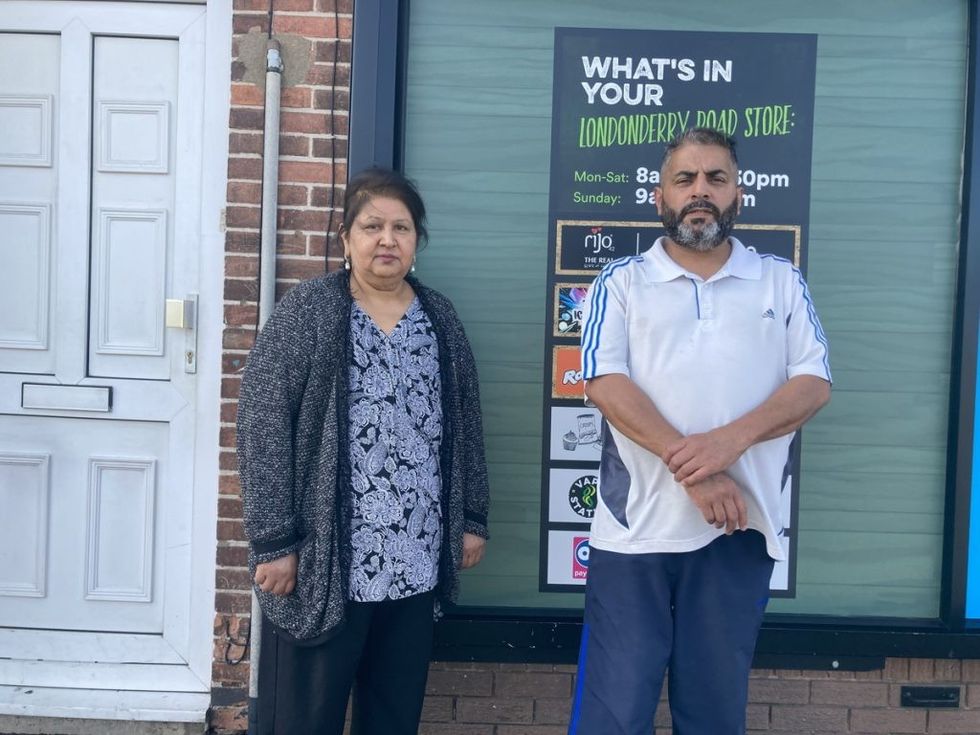Traders close to a Commonwealth Games venue claim they have been snubbed after being promised extra revenue and business opportunities from visiting sport fans.
Rajit Tagger, co-owner of Queen’s Fish Bar at Londonderry Road, Oldbury, claims his business has had a fall in profits because of road closures associated with the Games near Sandwell Aquatics Centre.
He said: “The whole thing has been a massive disaster for us. We’ve had many spectators visit the Aquatics Centre, but the majority of them stay inside the venue and eat there while the Games takes place. Then they travel to and from the Games via the shuttle buses down Manor Road, so they don’t visit the local area.
“Our regulars haven’t visited us because of the road blocks down Londonderry Lane. We’ve had seven or eight people as walk-ins after the Games have ended, but we’ve dropped our takings by a third.”
Mr Tagger, who has run his fish and chip bar for over 16 years, said he and other businesses were promised an increase in customers visiting the area, but that has not materialised.
“When I was a member of the Queen’s Head Traders Association, which represents our traders on this road, we were told by the council we would see an increase in footfall. We were having lots of meetings and they promised us this. But we’ve had no extra trade. Our customers are afraid to come out because of the road closures.
“At one point, I even considered closing at 8pm on a Friday because the footfall was that bad.”

Other traders have experienced a dramatic decrease in profits. One, who did not wished to be named, said his profits were “down £3,000 a week” because of the road closures.
Suki Kaur, who runs Cake Break on Londonderry Road, said her trade had also been affected by road closures.
She said: “No one is going to order from us if roads are closed. It’s really affected my business. Before the Commonwealth Games we were so busy with orders flying off the shelves. But now, hardly anything.”
Shelia Kaur, who runs a corner shop, explained some cars have been parked on Londonderry Road for four or five days during the Commonwealth Games.
“They’re blocking the road up which means my customers can’t visit. If my customers can’t visit, they’ll turn elsewhere and that could mean they don’t come back. We’ve already had disruption due to the lockdown. I’m worried it will affect my business.”
One resident who visited Ms Kaur’s corner shop on the same day the LDRS visited Londonderry Road explained it was the “first time” he visited because of the road closures.
Rick Chiswell, who owns Ian’s Butchers, wrote a letter to Sandwell council two weeks ago explaining his dismay at the road closures. He estimated £500,000 of trade would be lost and “not recoupable.”
He said: “Much to our disappointment we have found the lack of communication through consultations and considerations to above does not seem to justify the end results. Their currently does not seem to be any benefit to local residents or traders, with traders having to deal with the continuous lack of trade due to the disruption through the development and the planned events.
“It is also important to raise that on the trial run spectators were bused in and out so no extra business was generated from the event. As we understand the reasoning for this is to reduce congestion in the area, traders were impacted due to lack of customers. Also to add to the disruption and lack of trade there were food vendors on site selling products that were available in the neighbouring shops.”

In a lengthy response, a Sandwell council spokesperson said: “We are working hard to keep disruption to a minimum for residents, businesses and customers while road closures are operational, and make it as easy as possible for them to access properties.
“Sections of two roads – Londonderry Lane and Manor Road – are closed to general traffic, but they are both still accessible to residents, businesses and essential visitors with permits.
“These measures are designed to make sure residents can access their homes safely and reduce spectator parking in residential areas. The shops are located outside the barriered area and people can walk or drive around the road closures to get to them.
“While the parking restrictions are operational, we are being as flexible as we can to help businesses – for example, motorists who park to use local shops around Sandwell Aquatics Centre will be allowed 20 minutes before tickets are issued.
“We are also leaving in place the one-hour limited parking bay for the use of shoppers who require more than 20 minutes for shopping.”
Sandwell council told the LDRS the Labour-led local authority had been in contact with the traders association for a number of years and had improved pedestrian accessibility to their shops, including new zebra crossings and improved public spaces around the shops.
They claimed the “improvement works would not have taken place” if it were not for the development of the Aquatics Centre.
They added: “Many thousands of people are visiting Sandwell Aquatics Centre during the Commonwealth Games. Spectators as well as marshals, stewards and council staff working at the event are using the shops.”
The council also dismissed traders’ claims that they have lost out on custom for tourists visiting the Aquatics Centre.
They said: “When [Sandwell Aquatics Centre] becomes a key part of community life as a fantastic leisure facility, the centre will bring people to the area from across the region who have been inspired by the Games.
“This is a once-in-a-lifetime event and opportunity – we thank residents and businesses for their patience and understanding during the Games and apologise for any inconvenience.”





